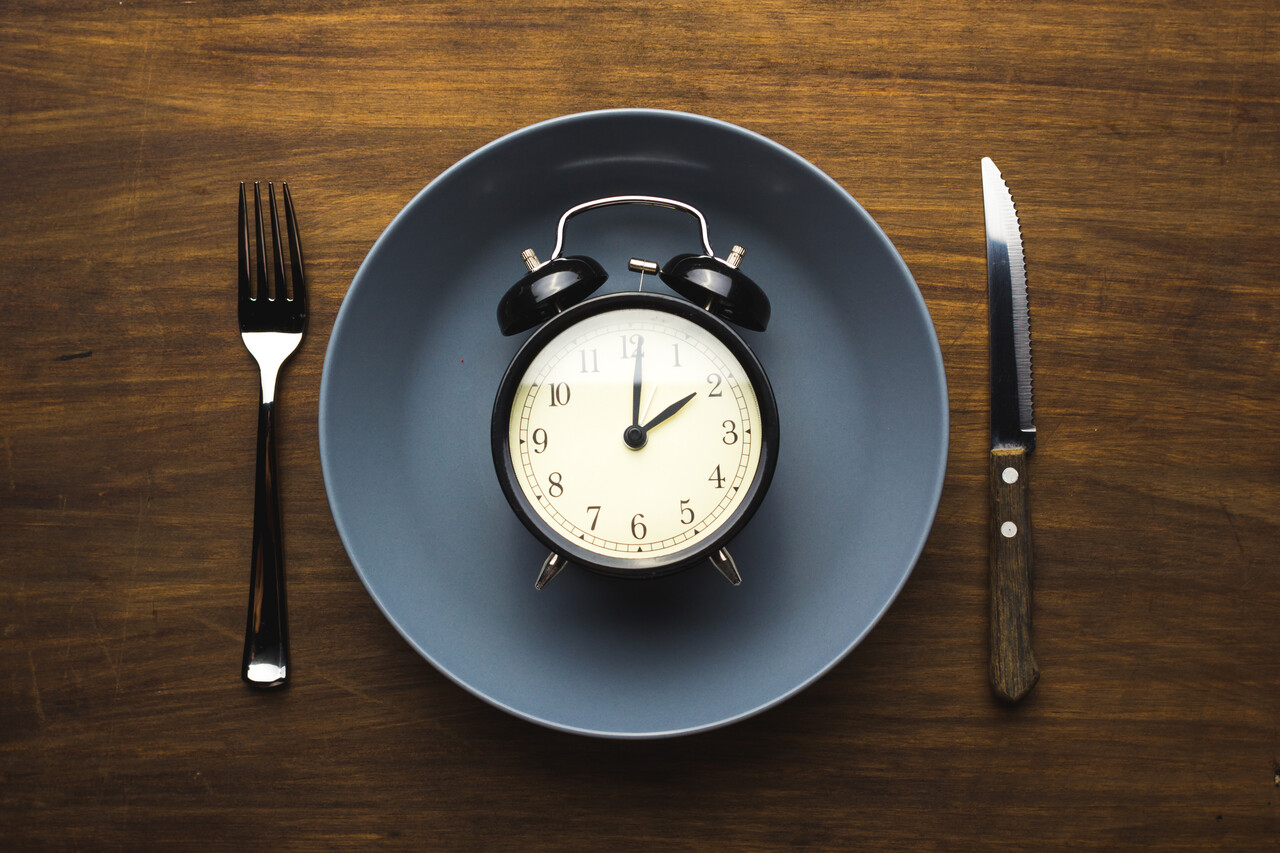
UP TO 40% OFF SITEWIDE






Intermittent Fasting for Type 2 Diabetes | Sugar MDs


Table of Contents
- What is intermittent fasting and what it is not?
- What is not intermittent fasting
- What time of the day is best for intermittent fasting?
- How often or how many days a week to fast?
- What is the difference between a reduced-calorie diet versus intermittent fasting?
- Doing intermittent fasting and not losing weight, should I continue?
- Will I lose muscle while intermittent fasting?
- What changes happen in your body when you fast?
- What are the benefits of using ketones as a source of energy?
- Can intermittent fasting reduce cardiovascular disease?
- How to deal with the side effects or symptoms during intermittent fasting?
- Can I exercise during intermittent fasting?
- Important points for diabetics trying intermittent fasting
What is intermittent fasting and what it is not?
Intermittent fasting is fasting for a long time, typically 16 to 20 hours a day. Some people prefer fasting for a shorter time such as 8 to 12 hours but that's not necessarily the same as 16 hours of fasting when it comes to health benefits.
Intermittent fasting 16 to 20 hours a day can help reverse insulin resistance and put diabetes in remission. Today's topics are What is intermittent fasting and what it is not? What happens in your body when you fast intermittently Why should you fast intermittently? How do deal with side effects such as irritability or mood problems Working out while fasting How should diabetics do intermittent fasting
What is not intermittent fasting
It isn’t fasting for two to three days. After 2 to 3 days of fasting, you will really feel weak. In addition, you can actually get the benefits from fasting just by fasting 16 hours, and that includes drinking, not just dry fasting.
What time of the day is best for intermittent fasting?
16 hours of fasting can be at any time during the 24 hours depending on your schedule and depending on your eating habits. You are giving yourself eight hours of eating period or for some people, it is 20 hours of fasting and four hours of eating period.
An important caveat is that you should not binge eat after 16 hours of fasting. Meaning, we have to still control our calories. So we have to make sure that we are restricting our calories significantly during the days of intermittent fasting typically between 800-1200 cal/day.
How often or how many days a week to fast?
Some people do the 5:2 rule which is two days of fasting out of seven days in a week. Some other people do three days of fasting and four days of regular eating.
What is the difference between a reduced-calorie diet versus intermittent fasting?
Cutting the calories or counting calories such as down to 1200 calories or 1500 calories versus intermittent fasting can result in similar weight loss but there are actually major differences. Studies show that if you are fasting 16 hours a day or more up to 20 hours two to three times a week your insulin resistance will dramatically improve and you may actually go into diabetes remission.
Studies show that people who reduce their total can still lose weight but their insulin resistance and diabetes remission does not necessarily happen in all cases. Bottom line, it has been proven that eating pretty much nothing just drinking non-caloric beverages during that 16-hour period or 16-20 hours a day, if you can do that twice or three times a week you are going to have a major benefit.
I am not asking you to fast the entire week. You just need to do intermittent fasting 2-3 days out of seven days. You can pick your days on days you’re not super busy or you’re not super active when you’re just chilling and relaxing. You need to make sure that, on those days, remember to set yourself a goal not to eat anything for 16 to 20 hours. You can trust me, you’re going to see a dramatic improvement in your insulin resistance.
Doing intermittent fasting and not losing weight, should I continue?

Intermittent fasting
Yes, studies also show that even if you don't lose weight at all while doing intermittent fasting for 2 to 3 days a week which could be due to consuming excess calories during the eating times, your insulin resistance will still improve. You're going to lose abdominal/visceral fat.
Will I lose muscle while intermittent fasting?
Muscle loss is very minimal compared to reducing your calories. If you are actually doing intermittent fasting as a diabetic twice a week 16 to 20 hours a day you are going to keep your muscles and you are going to lose abdominal/visceral fat.
Intermittent fasting is very doable for diabetics which means that if you are a type II diabetic you are not going to have to take too many medications or you will not have to take insulin anymore. Remember, this is not starvation for a long time. You're just doing that twice a week 16 to 20 hours.
I think that's a good bargain for diabetics because I'm not necessarily asking to cut everything and fast every day or go to a keto diet. Just do that intermittent fasting with limited calories twice a week and you will see the difference.
What changes happen in your body when you fast?
Your body is burning the glucose first 8 to 12 hours of fasting. Then, you start burning the fatty acids. Your muscles are full of triglycerides and glycogen (stored glucose/sugar).
So for example, when you eat on a regular basis glucose goes to your muscles and if this glucose is not used by your muscles due to lack of physical activity or excessive calories glucose turns into triglycerides which is a form of fat.
Our body starts using triglycerides in a fasting state once you deplete the glucose and glycogen stores. Then, triglycerides turn into fatty acids, and the fatty acids turn into ketone bodies. So, you start burning ketones.
What are the benefits of using ketones as a source of energy?
The ketones are not necessarily just a breakdown of fatty acids but the ketone bodies have a lot of major functions in the body. Ketone bodies function as a housekeepers or gatekeeper. They’re like police officers. Ketone bodies stimulate certain proteins and molecules in the body to repair the damage from oxidative stress.
During fasting, cells activate pathways that enhance defenses against oxidative and metabolic stress. They help remove or repair damaged molecules. Have you thought about while we work eight hours and rest 16 hours in a day? What would happen if you worked 16 hours a day every day instead of 8 hours? I think you would burn out, become too stressed, and end up being sick.
So you are working eight hours a day and the rest of the time you’re resting because your body has to recover from the stress of the work, and regenerate muscle and brain activity. In the same sentence, your body needs a break from eating because every time you eat you’re introducing potentially toxic chemicals into your body.
Sometimes those toxic chemicals occur during the metabolism of the food. These toxic chemicals create what we call oxidative stress. Oxidative stress can be damaging to our healthy tissues. Ketones help eliminate oxidative stress. Cells within your body also have to regenerate. We call that process autophagy.
Autophagy means that your cells have to destroy themselves so that new ones come in and replace the old ones. Ketone bodies also induce that process. They also help create molecules and cytokines such as adiponectin which has been shown to reduce insulin resistance.
Ketone bodies also help get rid of inflammatory cytokines such as TNF alpha. As a result of this reduction in inflammation, we know that ketones help patients who have epilepsy or other inflammatory disorders such as rheumatoid arthritis, inflammatory bowel disorders, arthritis, etc.
Remember, diabetes and insulin resistance is an inflammatory state. When the patient is overweight the adiponectin levels go down and inflammation levels go up. Fat cells create a lot of inflammation when they are too full and stressed. Ketone bodies are the only way for fat cells to unload.
In the absence of fasting and a constant calorie load fat cells go into metabolic and oxidative stress. Lack of protection from ketone bodies makes the situation worse. The moment you go into fasting, then suddenly the ketone bodies start repairing the inflammation. When the inflammation goes down insulin resistance improves.
Can intermittent fasting reduce cardiovascular disease?
Yes, another benefit of ketogenesis during intermittent fasting and ketone bodies is protecting the endothelial cells which are the cells on your blood vessels, your arteries. This fact translates into a reduction in cardiovascular disease
How to deal with the side effects or symptoms during intermittent fasting?
When you fast for 16 hours, you are going to be irritable. You are going to feel weak. You are going to have a little bit of mental fog. The good news is that the symptoms will go away within the first 2 to 4 weeks of intermittent fasting practice. Similar symptoms are reaction antibodies that happen when you start exercising after a sedentary lifestyle.
You start going out to the workouts and you to the gym and the next thing you feel like all of your muscles are failing. However, if you keep going to the gym, your body will learn to recover from the stress response and you will have stronger muscles and more endurance/fitness.
The process is not any different than going through alcohol withdrawal or a smoker stopping smoking. At first, you are not going to feel good because your body is not used to fast for a long time. But once you go through the symptoms of intermittent fasting, you’re going to be a new person in a few weeks.
So, you have to be patient for the side effects to go away. In the meantime you’re going to be irritable, you also have to control yourself since it’s your body you’re going through this, not your spouse or your family. You don’t have to put other people under the same stress that you’re going through. It is not a bad idea for you to explain to people around you what you are going through and how it is a temporary symptomatic process.
Can I exercise during intermittent fasting?

Intermittent fasting
Yes, you can but I have a very important suggestion. You have to stay hydrated and listen to your body. Also, do not force yourself if you feel too fatigued. You can do a milder cardio workout. It is going to help you a lot with weight loss because you’re already burning fat during fasting.
Doing some sort of aerobic exercise is going to be very useful. When it comes to lifting, fasting time may not be the best time to lift because your muscles are going to be totally depleted of glycogen. Typically with resistance exercise, your muscles use glycogen or glucose preferably so your performance is going to be very limited. Therefore, I would suggest doing your lifting in the fed state, maybe two hours after eating.
Important points for diabetics trying intermittent fasting
If you are contemplating doing intermittent fasting you should talk to your endocrinologist. Patients who are on short-acting or fast-acting insulin have to be very careful because if you take a short-acting or fast-acting insulin when you’re not eating that’s going to mean severe hypoglycemia (low blood sugar).
On the other hand, if you’re in long-acting insulin you still have to be also very careful yet results are not going to be as disastrous as a fast-acting insulin. You will require less basal insulin during intermittent fasting and in the following days because your insulin resistance will go down dramatically.
As a result, you have to really monitor your blood sugars very closely. On those days that you’re not going to eat anything for 16 to 20 hours, you have to really remember to reduce the basal insulin amount The most common basal insulins are Tresiba, Toujeo, Lantus, Levemir, Novolin N, and Humulin.
Whatever you’re on reduce your basal insulin by 20% if your blood sugars are not above 200 in the morning, to begin with. I also do not recommend stopping the basal insulin prematurely. Unfortunately, a lot of people don’t understand the role of basal insulin.
Because of insulin resistance, type II diabetics still need some insulin at baseline to maintain their blood sugar stable without an increase. Patients with type 1 diabetes also need basal insulin at all times since they do not produce any. Basal insulin helps prevent the liver from making too much sugar.
On the other hand, excessive basal insulin can totally stop glucose production from the liver which can lead to severely low blood sugar. Patients who were on sulfonylureas such as glipizide, glimepiride, and glyburide need to be extremely careful.
Since the effect of these oral pills is unpredictable on insulin production patients may develop severely low blood sugars when today do not eat. Make sure to tilt your doctor to see if there is an alternative medication to sulfonylurea agents.
GLP-1 class medications such as Ozempic, Trulicity, rybelsus, Victoza, and Bydureon do not drop your blood sugars, so you can still take those medications to regulate your blood sugars especially if your blood sugars are going up without taking them. Another medication class that can be relatively safe is SGLT2 inhibitors such as Jardiance, Farxiga, Invokana, and Steglatro.
Although there is a small risk of diabetic ketoacidosis with these agents there is no evidence that fasting will increase that risk. Pioglitazone is another safe agent during intermittent fasting. Bottom line, intermittent fasting 2-3 times a week around 16 to 20 hours a day is a great way of reducing insulin resistance and putting diabetes into remission.
If diabetes remission is not possible it will reduce at least the amount of medications taken and potentially eliminate the need for insulin for type II diabetics. Intermittent fasting also has other benefits such as reducing inflammation and reducing cancer risk. AHMET ERGIN, MD, FACE, CDCES, ECNU ENDOCRINOLOGIST 2260 Palm Beach Lakes Blvd. Step 212 Unit #7 West Palm Beach, Florida.
Written By Dr. Ahmet Ergin
464 total articles
Meet Dr. Ahmet Ergin, a highly skilled and dedicated endocrinologist with a passion for diabetes care. Dr. Ergin earned his medical degree with honors from Marmara University in Istanbul. He completed internal medicine residency and endocrinology fellowship at Cleveland Clinic. Dr. Ergin is board-certified in Internal Medicine, Endocrinology, Diabetes, and Metabolism due to his vast medical expertise. He's a certified diabetes educator, author of “The Ultimate Diabetes Book,” and founder of “the SugarMD YouTube channel.” Dr. Ergin offers exceptional diabetes care to his patients in Port Saint Lucie, FL, helping them manage effectively. For a closer look into his insights and experiences, connect with Dr. Ahmet Ergin on LinkedIn, Instagram, and YouTube.”
Disclaimer: These statements have not been evaluated by the Food and Drug Administration. Information on this website isn't intended to treat, cure or prevent any disease. Discuss with your doctor and do not self-treat.
Products









